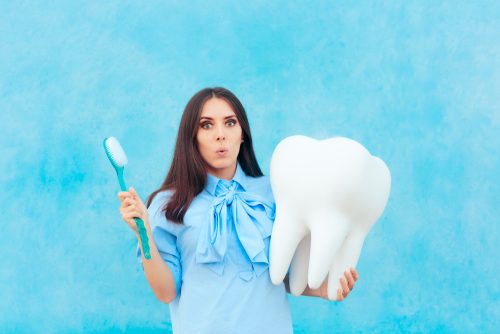
I brush and floss every day yet why do I continue to get cavities? People ask me this all the time and the answer I give them goes usually something like this.
“Well, can you tell me more about your diet?”
The answer to this question can often help us find the answer. Most people know that eating too many sweets can cause cavities. I often hear this answer, “I eat very healthy, lots of fruits and vegetables, lean meats, low fat, etc.” Even people who are on a Keto type of diet can get cavities because the disease is multifactorial in its ability to develop and progress.
Besides dietary factors, there are saliva quality and quantity, overall body/mouth pH or acidity levels, genetic predisposition, microbial populations, oral hygiene effectiveness, the use of some prescription medicines, tobacco use, and fluoride uptake systemically and topically. Some of these factors are out of our control and some are not. Therefore, in order to help minimize your risk of getting cavities, it is best to work on the factors you can control. Let’s take a look at two of these factors.
1. Oral hygiene effectiveness: brushing should be done twice a day for a minimum of two to three minutes. Toothpaste should contain fluoride and some people may require additional minerals or higher fluoride concentrations so ask your dentist what is right for you. It is best to floss daily either am or pm and do it prior to brushing. Angling the toothbrush at a 45-degree angle to the gums and brushing in a circular motion to sweep plaque off the gum line is the best way to brush. If someone has a higher risk for cavities an anti-cavity mouth wash used daily can also help.
2. Dietary factors: In general it is best to stay on a low carb diet and if that is not possible to equally divide all carb, protein, and fat calories for the day’s intake. Eating whole and natural foods is the best way to keep a healthy mouth and body. A good rule of thumb is to not eat or drink anything that comes in a package, can, or bottle. Simple sugars or any fermentable carbohydrates should be avoided. It is better to eat fruits than drink them and even diet soda is bad. Energy drinks like Red Bull and Monster (even sugar-free) are notorious for causing cavities.
The frequency of eating is also detrimental and can increase your risk of cavities tremendously. It is best to eat meals several hours apart so that your mouth has a chance to recover from the acidity caused by eating. This is why snacking is a no-no if you want to reduce your risk of cavities. If you must eat several small meals a day — which many people who have had gastric bypass surgery often do — then chewing sugarless gum with xylitol after eating is very beneficial. Do not brush immediately after eating; wait about 20-30 minutes to avoid dental erosion. Contact our dentist today for more information!
To be continued…
